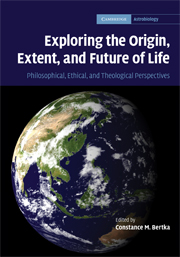 Exploring the Origin, Extent, and Future of Life
Exploring the Origin, Extent, and Future of Life from Part II - Extent of life
Published online by Cambridge University Press: 29 December 2010
The premise of my chapter is that history can be not only enlightening in itself but also significant in a variety of contemporary contexts. One clear example of this is in connection with the theological, ethical, and philosophical implications of the search for life, because these issues have been addressed again and again throughout history as the possibility of life beyond Earth has been raised. It is true that most of the historical debate has centered on extraterrestrial intelligence rather than microbial life. But at least part of the interest in the search for microbial life is that it is an indication of the prevalence of intelligence in the universe. This explains in part the uproar over the claims for nanofossils in the Mars rock in 1996 – much more was at stake than primitive life on Mars itself. This connection between microbes and intelligence is made especially in the popular mind, despite the fact that many evolutionists would argue that the gap between microbes and intelligence is greater than that between life and non-life. Thus, Peter Ward and Donald Brownlee have recently, and famously, argued that the universe may well be full of microbes, but not intelligence, making ours a “Rare Earth”. If this is true, the study of the implications of microbial life beyond Earth is all the more important.
To save this book to your Kindle, first ensure [email protected] is added to your Approved Personal Document E-mail List under your Personal Document Settings on the Manage Your Content and Devices page of your Amazon account. Then enter the ‘name’ part of your Kindle email address below. Find out more about saving to your Kindle.
Note you can select to save to either the @free.kindle.com or @kindle.com variations. ‘@free.kindle.com’ emails are free but can only be saved to your device when it is connected to wi-fi. ‘@kindle.com’ emails can be delivered even when you are not connected to wi-fi, but note that service fees apply.
Find out more about the Kindle Personal Document Service.
To save content items to your account, please confirm that you agree to abide by our usage policies. If this is the first time you use this feature, you will be asked to authorise Cambridge Core to connect with your account. Find out more about saving content to Dropbox.
To save content items to your account, please confirm that you agree to abide by our usage policies. If this is the first time you use this feature, you will be asked to authorise Cambridge Core to connect with your account. Find out more about saving content to Google Drive.